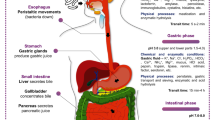Abstract
Lactobacillus salivarius, a probiotic bacterium, encounters acidic conditions in its passage through the gastrointestinal tract of human and animal hosts. We studied the effect of a rapid downshift in extracellular pH from 6.5 to 4 on cell growth. The maximum growth rate was higher in low pH medium with glutathione supplementation than without. Cells developed a GSH-mediated acid-tolerance response and, when grown with 0.5 mM GSH, reached a higher final density than with other conditions. These findings suggest that the increased growth rate is caused by uptake of GSH which acts as a nutrient source as well as having protective functions, allowing for continued growth.



Similar content being viewed by others
References
Anderson ME (1985) Determination of glutathione and glutathione disulfide in biological samples. Methods Enzymol 113:548–555
Chesney JA, Eaton JW, Mahoney JR (1996) Bacterial glutathione: a sacrificial defense against chlorine compounds. J Bacteriol 178:2131–2135
Cotter PD, Hill C (2003) Surviving the acid test: responses of gram-positive bacteria to low pH. Microbiol Mol Biol Rev 67:429–453
Gopal S, Borovok I, Ofer A, Yanku M, Cohen G, Goebel W, Kreft J, Aharonowitz Y (2005) A multidomain fusion protein in Listeria moncytogenes catalyzes the two primary activities for glutathione biosynthesis. J Bacteriol 187:3839–3847
Huang CS, Moore WR, Meister A (1988) On the active site thiol of γ-glutamylcysteine synthetase: relationships to catalysis, inhibition, and regulation. Proc Natl Acad Sci USA 85:2464–2468
Jepsen HF, Pocsi I, Jensen B (2008) The glutathione response to salt stress in the thermophilic fungus, Thermomyces lanuginosus. Acta Biol Hung 59:357–363
Kim EK, Cha CJ, Cho YJ, Cho YB, Roe JH (2008) Synthesis of γ-glutamylcysteine as a major low-molecular-weight thiol in lactic acid bacteria Leuconostoc ssp. Biochem Biophys Res Commun 369:1047–1051
Kosower NS, Kosower EM (1978) The glutathione status of cells. Int Rev Cytol 54:109–160
Li Y, Hugenholtz J, Abee T, Molenaar D (2003) Glutathione protects Lactococcus lactis against oxidative stress. Appl Environ Microbiol 69:5739–5745
Meister A, Anderson ME (1983) Glutathione. Ann Rev Biochem 52:711–760
Riccillo PM, Muglia CI, de Bruijn FJ, Roe AJ, Booth IR, Aguilar OM (2000) Glutathione is involved in environmental stress responses in Rhizobium tropici, including acid tolerance. J Bacteriol 182:1748–1753
Smirnova GV, Krasnykh TA, Oktyabrsky ON (2001) Role of glutathione in the response of Escherichia coli osmotic stress. Biochemistry (Moscow) 66:973–978
Yun JH, Lee KB, Sung YK, Kim EB, Lee HG, Choi YJ (2009) Isolation and characterization of potential probiotic lactobacilli from pig feces. J Basic Microbiol 49:220–226
Zhang J, Fu RY, Hugenholtz J, Li Y, Chen J (2007) Glutathione protects Lactococcus lactis against acid stress. Appl Environ Microbiol 73:5268–5275
Acknowledgments
This study was partially supported by a graduate fellowship from the Brain Korea 21 and the Research Institute for Agriculture and Life Science, Seoul National University.
Author information
Authors and Affiliations
Corresponding authors
Rights and permissions
About this article
Cite this article
Lee, K., Pi, K., Kim, E.B. et al. Glutathione-mediated response to acid stress in the probiotic bacterium, Lactobacillus salivarius . Biotechnol Lett 32, 969–972 (2010). https://doi.org/10.1007/s10529-010-0244-6
Received:
Revised:
Accepted:
Published:
Issue Date:
DOI: https://doi.org/10.1007/s10529-010-0244-6




